BELGRADE (Sputnik), Victoria Mladenovich — A new round of talks on high level between Serbia and Kosovo kicked off in Brussels on Tuesday.
DIALOGUE DIFFICULTIES TURNED INTO PERSONAL GAINS
According to an expert from the Centre for Contemporary Politics, Nikola Burazer, the bilateral dialogue between is difficult because neither of the sides is fully committed to the process.
"Kosovan government faces serious opposition among Albanian parties and is afraid of granting too much power to Kosovo Serbs, who are strongly influenced by Belgrade, while in Serbia the presidential elections are approaching soon. We could expect the reduction of tensions, but no major advancements will probably come out of it,” an expert from the Centre for Contemporary Politics, Nikola Burazer, said.
The Serbian delegation on Tuesday’s meeting was for the first time represented both by Prime Minister Aleksandar Vucic and President Tomislav Nikolic. Executive Director of the Institute for European Affairs Naim Leo Besiri believes that Nikolic's involvement in the negotiation only had one purpose to check public opinion in Serbia to find out whether he has a chance to remain in power after the next elections, set for later this year.
According to an expert from the Belgrade Centre for Security Policy, Maja Bjelos, there is more than one way for Serbia to use president’s participation in the talks in Brussels to address both the domestic and international audience.
“Nikolic is perceived as a pro-Russian politician and opponent of Kosovo independence, and if talks proved to be futile, Vucic can blame someone for the potential failures of the talks. Or, this is the opportunity for Serbia to show to the international audience that there are no internal political disputes and Serbia has unanimous stance towards Kosovo,” Bjelos explained.
NATIONALIST RHETORIC ON BOTH SIDES
On January 14, the first passenger train since 1999 heading from the Serbian capital of Belgrade to Kosovo was stopped near the border over security concerns. The train was colored as the Serbian flag with the caption "Kosovo is Serbia" written in 21 languages on it. The incident was followed by harsh political statements by both Serbian prime minister and president which, according to Besiri, could also be related to the upcoming elections in Serbia.
Two days after, EU High Representative for Foreign Affairs and Security Policy Federica Mogherini voiced concern over the escalation of tensions between Serbia and Kosovo, and called on the parties to engage in dialogue.
“The rhetoric has been a repeated cycle between Belgrade and Pristina in the years of elections. This is a pattern followed by both parties to attract right wing voters. Kosovo issue has been fruitful for nationalism and nationalistic parties to spread fear for a short time with longer negative effects on societies and mutual trust,” Besiri explained.
According to Burazer, however, the harsh rhetoric is a consequence of both domestic and global circumstances.
“The recent outbursts of harsh rhetoric can be explained by the Serbian presidential elections… but also by global turbulences that are diminishing the pressure from the EU and USA to continue with the dialogue,” Burazer said.
Before the meeting in Brussels, Nikolic had said that the recognition of Kosovo’s independence was impossible “as long as Serbia exists.” He added that Mogherini, as mediator of the Serbian-Kosovo negotiations, had not presented any plan or agreement for signature during the talks in Brussels.
Nevertheless, according to Burazer, “the dialogue process still does not have a viable alternative for neither of the sides.”
Likewise, Besiri noted that “future of the negotiation is not in question” yet noted that “the shape and time-frame to implement already established agreements depend on responsibility and courage of the decision makers in Belgrade and Pristina.”
The high-level talks between Belgrade and Pristina are part of a negotiations process that began in March 2011 under the auspices of the European Union. On April 19, 2013, the parties concluded, but did not sign, an agreement on normalizing relations between the countries.
Kosovo unilaterally proclaimed independence in 2008 and is recognized by over 100 UN member states. Serbia does not recognize Kosovo’s independence.





